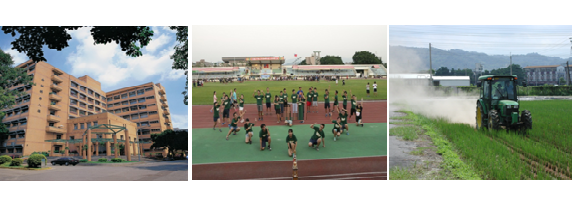View count:
9562
Introduction
National Chung Hsing UniversityCollege of Agriculture and Natural Resources
Department of Agronomy
History of Agronomy Department by year
1919 – this department was first founded as the College of Agronomy and Forestry in Taipei.
1922 – renamed as the Advanced College of Agronomy and Forestry.
1928 - reformed to the Special Division of Agronomy and Forestry of Taihoku Imperial University (now National Taiwan University).
1943 - moved to Taichung as an independent campus, renamed as Taichung Advanced College of Agronomy and Forestry.
1945 - the school was designated as the Taiwan Provincial Junior College of Agriculture.
1946 - the school was reorganized as the Taiwan Provincial College of Agriculture included Agronomy, Forestry, and Agricultural Chemistry departments.
1949 - was renamed as the Agriculture Department included Agronomy and Horticulture divisions.
1954 - the above two divisions became independent as Department of Agronomy and Department of Horticulture.
1968 - the graduate school was first established as The Graduate Institute of Food Crops under the Agronomy Department to offer the M.S. program.
1985 - the graduate institute offered the Ph. D. program.
1987 - the graduate Institute of Food Crops was renamed as Graduate Institute of Agronomy.
1998 - the undergraduate and graduate programs were merged under the administration of the Department of Agronomy
Mission
To solve the world agriculture and food security demands, and to provide the agricultural system with living, healthy, ecological, sustainable, and productive considerations through educational and research programs.
Goals
1. To meet the demands of social and world agricultural trends, to improve agronomic technology, to develop modern agriculture, to well-utilize the natural resources, and to develop new crop varieties.
2. Application of modern technology to improve the quality and quantity of plants and their products for food, feed, fuel, and medicinal utilization.
3. Expand the agricultural functions to benefit health, environment, entertainment, and culture to become an integrated agricultural industry.
4. Educate undergraduate with basic agronomic knowledge and general agricultural skills for agricultural industry.
5. Educate graduate students to become well-knowledged, highly skilled, creative and with the potential to be advanced researchers.
Our education and research program demonstrate and provide opportunity to whom are interested in extending the application of agronomy in agricultural science and ecology to contribute the human life.
Alumni achievements
The Agronomy department was established in 1919. Since then, many of our graduate students have played important roles in agricultural research and agricultural policy in government and have done great contributions to the successes of Taiwan agriculture.
The following are several achievements of our alumni:
1. The TN1 (Taichung Native 1) rice variety was bred by Mr. Ke-Ming Lin (1957) - the world first semi-dwarf rice variety that lead to the Miracle rice variety - IR8 in 1966 and the “Green revolution”.
2. The TNG67 (Tninung 67) rice variety was bred by Dr. Tseng-Sheng Huang (1948) – the most popular rice variety in Taiwan for more than 25 years and also one of the 12 varieties used in the rice whole genome SNP project.
3. The TCS10 (Taichung-Sen 10) rice variety was bred by Mr. Tsai-Fa Lin – a long grain indica rice variety.
4. The TC5 (Taichung 5) grain sorghum variety was bred by Dr. Shun Tu (BS. 1963) – a high yield and early maturing grain sorghum variety.
5. The TK9 (Tai-Keng9) rice variety was bred by Dr. Shih-Shen Hsue (BS. 1980, Ph. D. 2005) – a high grain quality rice variety.
6. The TNG71 (Tainung 71) rice variety was bred by Dr. Yih-Chuan Kuo (BS. 1968) – a popular aroma rice variety.
Scholarship
1. Many scholarships are offered by Department every year.
2. Grandma scholarship offers every semester by Agronomy alumni Mrs. Tze-Hsing Hsieh.
3. Know-you agricultural scholarship offers by Know-You Seed Company.
4. Many part-time lab-working opportunities are available at the Agronomy department.

